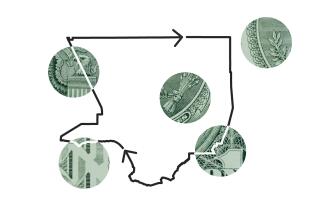Judge Orders State to Take Over Prosecution of Man Who Gave Funds to D.A.
Citing a potential conflict of interest, a Van Nuys judge ordered the state Wednesday to replace the Los Angeles County district attorney’s office as prosecutor of a defendant who contributed more than $250,000 to Dist. Atty. Ira Reiner’s campaigns.
The largess from 36-year-old Mark R. Weinberg of Beverly Hills, who is facing fraud charges, included a 7-year-old $50,000 loan that a Reiner aide said would be repaid this week.
For more than 18 months, Reiner’s office has been prosecuting the once highflying Westwood commodities broker on fraud and theft charges. But last month, the district attorney’s office asked that the state attorney general’s office take over the prosecution when Weinberg, seeking to have his bail lowered, cited his campaign contributions as proof of good citizenship.
Weinberg, a former millionaire who authorities allege swindled a group of investors in 1989 and 1990, is charged with six counts of writing bad checks and three of grand theft.
Weinberg first came to public attention in 1984 when he doled out hefty sums to top Democrats throughout the county while also claiming to be an undercover FBI informant on organized crime.
Reputed members of the Genovese crime family, Matthew (Matty the Horse) Ianniello and Anthony (Fat Tony) Salerno, were among his brokerage clients, as were FBI and Secret Service agents.
When Weinberg’s business crashed in 1985, triggering lawsuits by dozens of investors who claimed they had lost more than $10 million, Weinberg told The Times that the Mob had “looted my accounts.”
Both sides of Weinberg’s colorful past emerged Wednesday in Van Nuys Superior Court.
An FBI agent, summoned by Weinberg’s attorneys, testified at a closed session in Judge John S. Fisher’s chambers, it was learned. The FBI has long refused comment on Weinberg’s claim to have courted the underworld at the FBI’s behest.
Fisher barred reporters from the hearing and ordered attorneys on both sides not to discuss the session, but defense attorneys argued later in open court that the testimony “was very positive as to Mr. Weinberg’s position.”
FBI spokeswoman Karen Gardner declined comment on the case.
To press the request that the district attorney’s office be excused, Reiner dispatched a top lieutenant, Assistant Dist. Atty. R. Dan Murphy, to Wednesday’s hearing. Murphy said that although his office had been prosecuting the case vigorously, it should be excused because “there might be a perception of conflict of interest” because of the more than $200,000 in cash, plus the $50,000 loan, that Weinberg gave Reiner in 1984.
The Weinberg money accounted for about one-fourth of the total that Reiner, then Los Angeles city attorney, raised in his successful bid to unseat Dist. Atty. Robert H. Philibosian.
A Reiner press spokesman said the district attorney was unavailable for comment Wednesday and referred all inquiries about the loan to Bill Wardlaw, Reiner’s longtime campaign chairman.
Wardlaw said the $50,000 loan would be returned to Weinberg “no later than this week, because Ira realizes there is a problem with public perception here.”
Wardlaw said that although Weinberg’s $50,000 has been carried on the books as a loan, “we never repaid it because he told us he considered it a contribution, not a loan.” He said that Weinberg “recently said he wanted the loan back. So that’s what we’re going to do.”
Others who benefited from Weinberg’s generosity in the mid-1980s were Los Angeles Mayor Tom Bradley, Democratic presidential candidate Walter Mondale, and U.S. Sens. Alan Cranston of California and Bill Bradley of New Jersey. Tom Bradley received $84,000 and the others were honored at plush parties at Weinberg’s Beverly Hills home.
Fisher--conceding that Weinberg was a “heavy hitter with politicians,” but calling him a “flight risk” nonetheless--lowered bail only slightly Wednesday, from $1 million to $850,000.
Defense attorney James E. Blatt complained in an interview that his client is “suffering reverse discrimination, in that he is facing a higher bail because everyone wants it to appear that Mr. Weinberg’s connections are having no effect.”
With the state taking over the prosecution, Fisher said he did not expect the trial to begin for several months.
If convicted, Weinberg faces a maximum of five years in prison.
More to Read
Sign up for Essential California
The most important California stories and recommendations in your inbox every morning.
You may occasionally receive promotional content from the Los Angeles Times.










